-
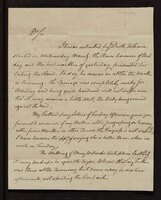 Benjamin Chew Jr. to Samuel Chew, October 19,1804
Benjamin Chew Jr. to Samuel Chew, October 19,1804 Letter from Benjamin Chew Jr to Samuel Chew primarily discussing the poor weather and states his servant & carriage driver "Dick", possibly enslaved, was held up by the rain. Benjamin remarks on his attendance of Mary Wilcocks' wedding, as well as the cost of repairs to a carriage.
-
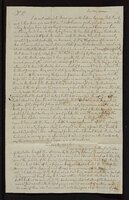 Benjamin Chew to Samuel Chew, undated
Benjamin Chew to Samuel Chew, undated Letter from Benjamin Chew to Samuel Chew, remarking on yellow fever in Chestertown as well as a treaty signed by the president the day prior. At the end of the letter it states. "Hammond took (?) his departure this morning Bond is now charge in attains (?)".
-
 Benjamin Chew Jr. to his sisters Chew, Howard, Philips, & Nicklin (1784-1839, undated)
Benjamin Chew Jr. to his sisters Chew, Howard, Philips, & Nicklin (1784-1839, undated) This folder is primarily reflective of Benjamin Chew, Jr.'s family life. It includes a letter to Peggy Chew from April 1784 where Benjamin details his vibrant social life and those he's met while studying in England. There is also an invitation to Henrietta, Maria, and "Mrs. Phillips" for dinner at Cliveden on March 17, 1839.
-
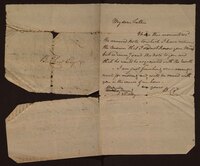 Letters from Benjamin Chew, Jr. to Benjamin Chew, Sr. (1807, undated)
Letters from Benjamin Chew, Jr. to Benjamin Chew, Sr. (1807, undated) Three letters from Benjamin Chew, Jr. to his father. The first letter seems to have been written on a note from a man asking Benajmin, Jr. if his father plans on selling his horses. The second letter is small and mentions Joshua Wallace and Thomas Biddle. On the back is a list of "deposits" from prominent men to one another, such as Edward Tilghman and Daniel Coxe, though it does not specify what for, but to be delivered to Thomas Newman. The first two small letters may have been enclosed in the third.
-
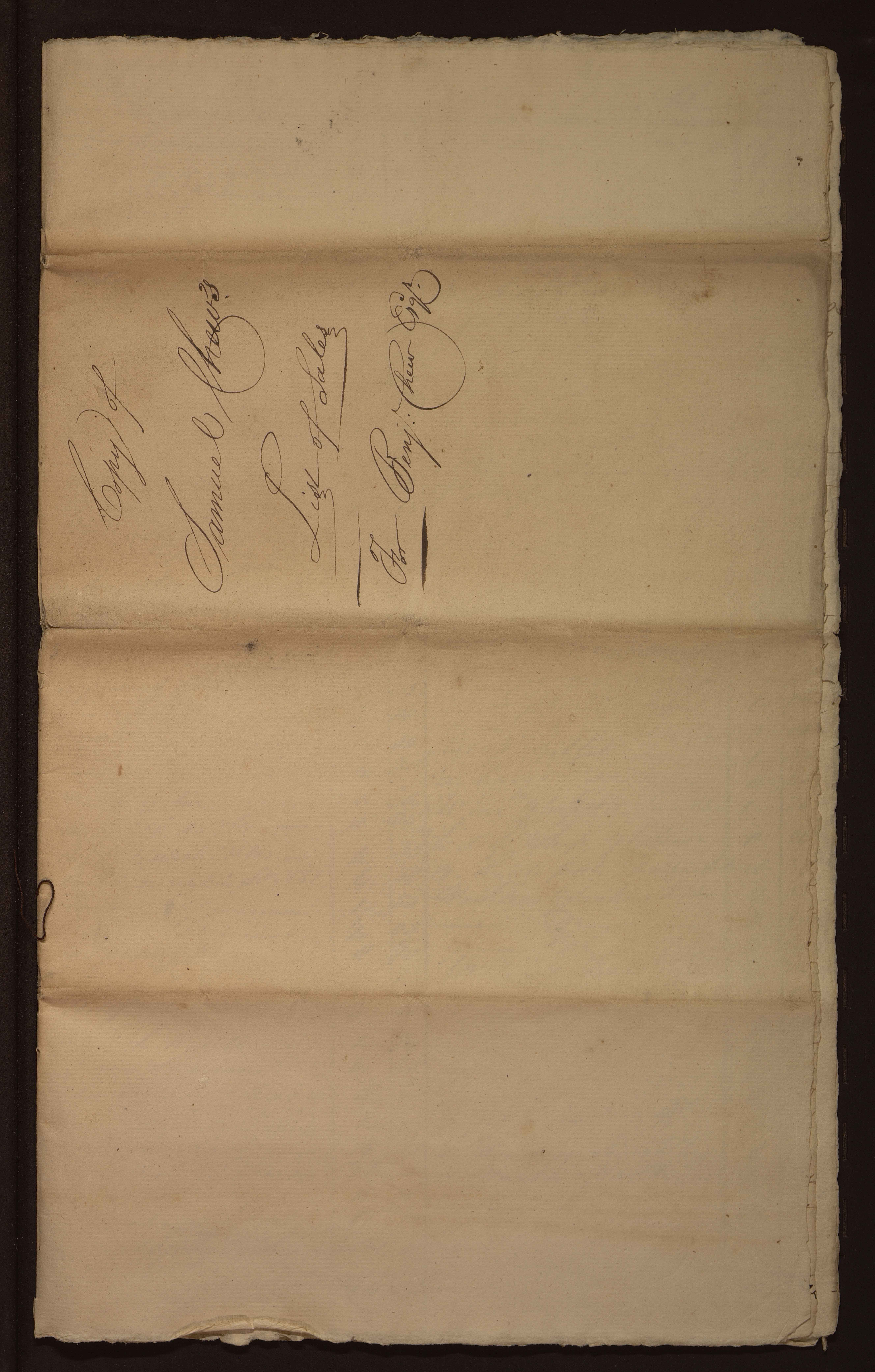 Property Sales – List of slaves sold from Samuel Chew's Cecil County plantations, 1812
Property Sales – List of slaves sold from Samuel Chew's Cecil County plantations, 1812 Found within a copy of "Samuel Chew's List of Sales for Benj. Chew, Esq." A comprehensive list of items sold from Samuel Chew's estate, including two pages listing the sales of slaves from Frisbey's Meadows, Great Plantation, and Rich Neck (images 5 & 6). Each line includes the slave's name, the name of the purchaser, and their price. There are a few lines indicating slaves not sold, such as Molly and Patty from Great Plantation, as well as "James" who was given to his mother.
African American people mentioned:
Frank, James, Bill, Perry, Ben, Solomon, Nicholas, Juliana, Sofhia (sp?), Lucy, Phoebe, Lemon, Abraham, Tom, Polly, Lydia, Emeline, Harriott, Susan, Nancy, Washington, James, John, William, James, Ephraim, "old Dick", Michael, Nat (sp?), Enoi, Henry, Philip, Aaron, Michael, Ben, Ro(sp?), Bill, Abraham, Sylvia, Judith's son (?), Jane, Eliza, Deana, Judith, Beck, Maria
-
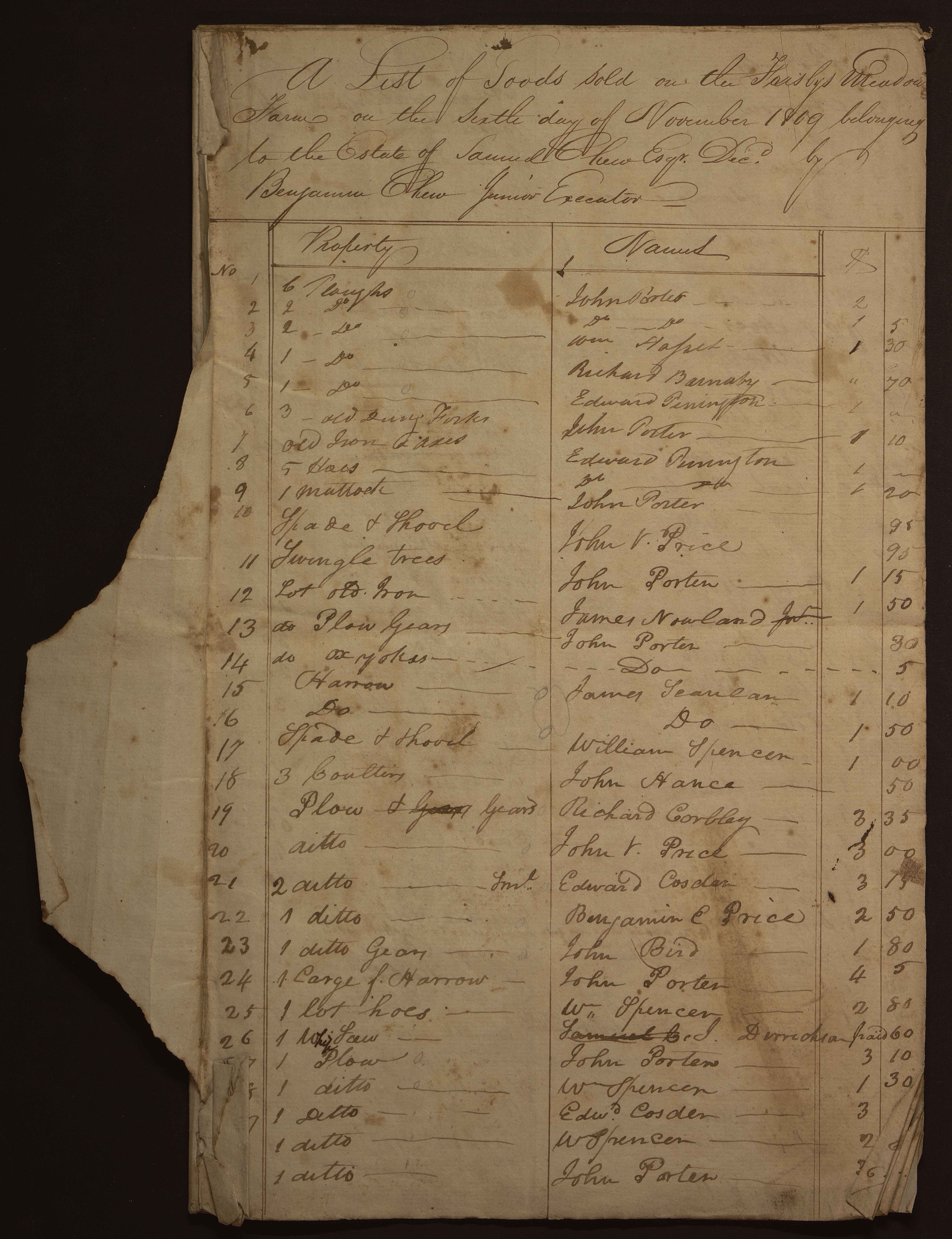 Property Sales – Inventories of Samuel Chew's estate, 1809
Property Sales – Inventories of Samuel Chew's estate, 1809 Inventories taken shortly after Samuel Chew's death, notices of property sales, lists of items sold, and lists of buyers and their payment schedules provide a detailed record of his material possessions. Many of these documents list slaves from the family's Maryland farms (Swan Point, the Great Plantation, Frisby’s Meadows, Veazey Farm) along with their monetary values, notes indicating those who were considered less valuable due to age or other infirmity, and names of spouse, children, and/or other family members. The official inventories of the estate also list provisions sent for use of the slaves, such as bacon, blankets, livestock, and other essentials. A separate file contains records of slaves sold and their buyers, provisions made for aged slaves, and other notes.
-
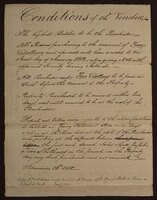 Property Sales – Conditions for the auction of "stock" from Benjamin Chew Jr's property Sassafras Neck (1809-1811, undated)
Property Sales – Conditions for the auction of "stock" from Benjamin Chew Jr's property Sassafras Neck (1809-1811, undated) Detailed instructions and protocol for the auction, or "vendue", of goods from Benjamin Chew, Jr's property, Sassafras Neck . Does not list what is to be sold.
-
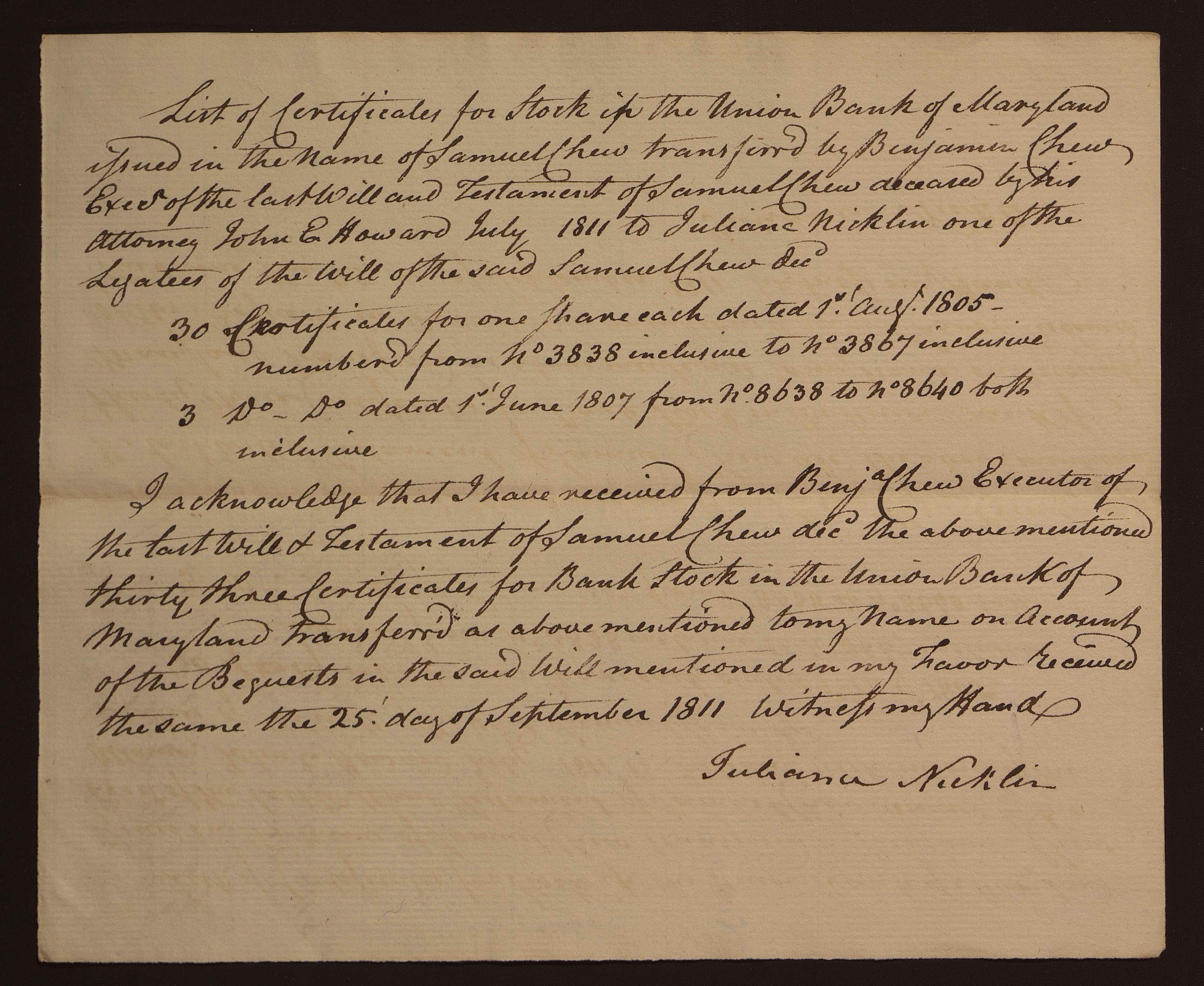 Inventories - informal notes and lists regarding Samuel Chew's estate, 1809-1812, n.d.
Inventories - informal notes and lists regarding Samuel Chew's estate, 1809-1812, n.d. Collection of informal notes and lists regarding the inventory of Samuel Chew's estate. Documents range from lists of stock, sundries, and slaves (with name and age) at Swan Point from overseer a Joel Smith, a list from Veazey's of farm utensils and enslaved people, a list of Samuel Chew's personal papers gathered by Frisby Tilghman and Benjamin Chew, Jr., and various notes on individual slaves. A collection of notes presumably by Benajmin, Jr., includes entries such as, "Abraham a very valuable character" and a reminder to "Enquire abt Henry and son of Lucy now at Rich Neck whether to take to Philada." There is also a list of expenses regarding Old Mark and Old Jenny, as well as a list of clothes for male slaves.
-
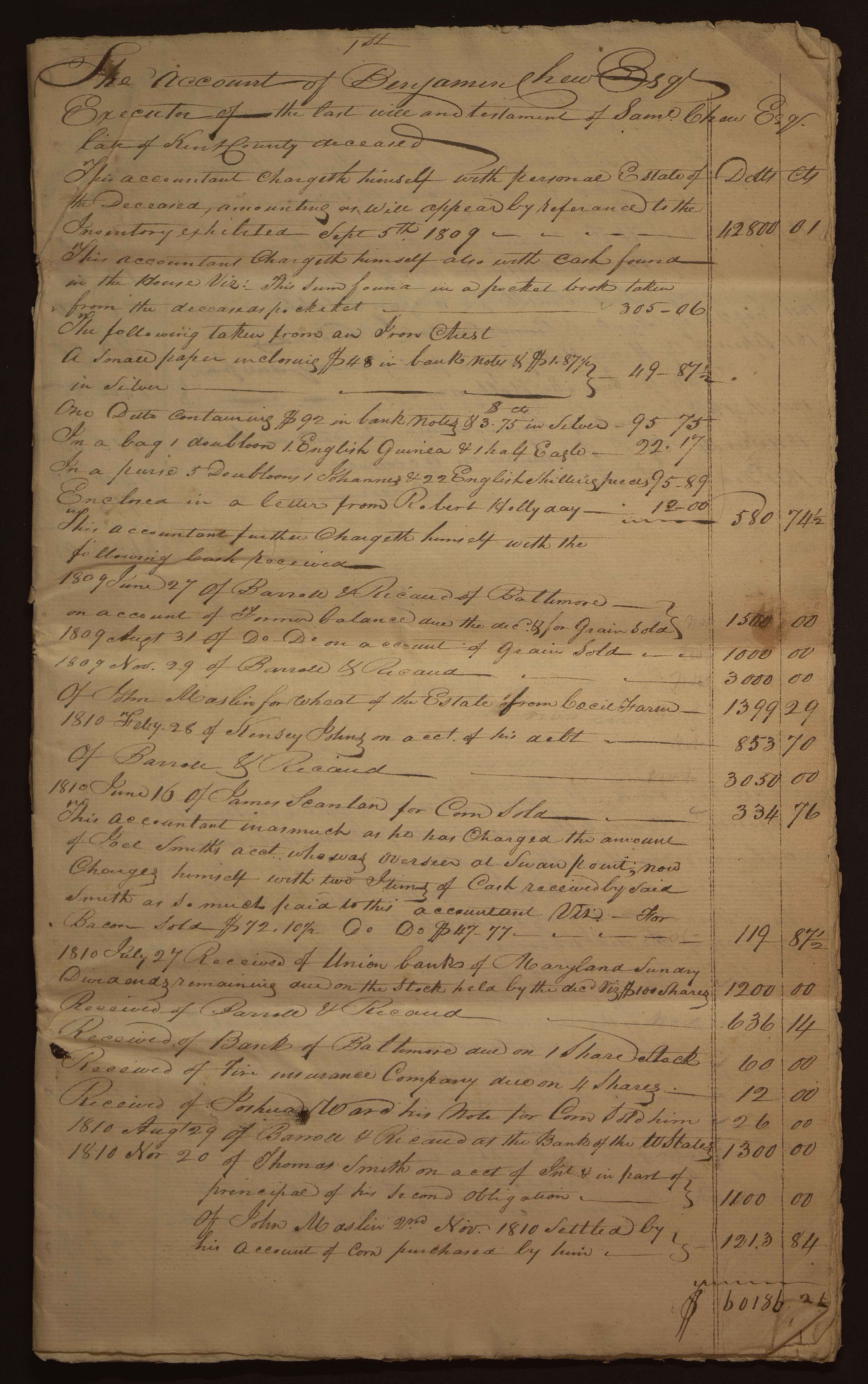 Inventories of Samuel Chew's estate, 1809-1812, n.d.
Inventories of Samuel Chew's estate, 1809-1812, n.d. Comprehensive inventories taken shortly after Samuel Chew's death, primarily lists of items sold and sometimes their buyers and payment schedules, providing a detailed record of his material possessions. Records are sectioned by property- home in Chestertown, Swan Point, the Great Plantation, Frisby’s Meadows, and/or Veazey Farm.
Many of these documents include lists of slaves with their name, age, any infirmaries such as blindness or simply "sickly", and sale prices/worth, and often are found within lists of goods like household furniture or livestock (such as images 13 & 14.) The official inventories of the estate also list provisions sent for use of the slaves, such as bacon, blankets, livestock, and other essentials.
-
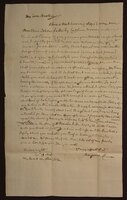 Letters from Benjamin Chew & Benjamin Chew, Jr. to Samuel Chew (1793-1806, undated)
Letters from Benjamin Chew & Benjamin Chew, Jr. to Samuel Chew (1793-1806, undated) Focuses on two letters, the first dated April 15, 1806 (images 5 & 6) from Benjamin Chew, Jr. and Benjamin Chew to their uncle and brother Samuel Chew, written on opposite sides of the same paper. Benjamin, Jr. states that he is obliged to his Uncle John to "make communication to Saml Beck who has made enquiries on behalf of Capt Vickers about the cursed Langford’s Bay Plantation” but does not state about what exactly. The second letter (image 14), is simply dated "Thursday night", again a dual letter from Benjamin Chew, Jr. and his father. It focuses mostly on political matters, including multiple mentions of "Mr. Jay" (John Jay), and discusses the "12th article" and its effect on trade, specifically sugar and cotton, especially with the West Indies. He states that "in the two or 3 Southern States... the Article met an almost unanimous disapprobation - the Motion for the Suspension of it came from the warmest Federalist - the subject of the Blacks is passed in Silence & nothing discussed in relation to them.”
-
 Benjamin Chew to Samuel Chew, October 16, 1804
Benjamin Chew to Samuel Chew, October 16, 1804 The first letter mentions a "letter by Dick," an enslaved man. Likely meaning that specific letter was delivered by him to Samuel Chew.
-
 Various accounts and receipts for the plantations of Samuel Chew, 1795-1809
Various accounts and receipts for the plantations of Samuel Chew, 1795-1809 Receipts or account records for John Sappington, James Scanlan, and James Berry who rented/managed plantations for Samuel Chew, as well as a few other unknown individuals. These include receipts for hickory wood, liquor (described as "two gallons of spirit"), new ploughs, and a receipt for the making of clothing including a new coat and breeches for Dick, an enslaved man, and a vest and coat for "Charles Gordin" (possibly also enslaved?).
-
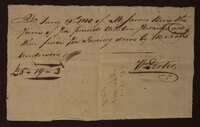 Three receipts from William Forbes for slaves' shoes, 1797-1801
Three receipts from William Forbes for slaves' shoes, 1797-1801 Three separate receipts from William Forbes to Samuel Chew (1737-1809), reflected in images 5-9. The first receipt, dated July 31, 1797, is for 90 pairs of shoes for 9 pounds 10 shillings, witnessed by James Barroll. The second, dated August 20, 1801, is for "79 pair of negro shoes," and the third receipt from October 2, 1800 charges for the "making 84 pair of Negro shoes."
-
 Note mentioning James Cannon, January 20, 1800
Note mentioning James Cannon, January 20, 1800 Small cutting of paper referring to James Cannon, possibly an estate manager of the Chew's. It is unclear what it is for, but the back identifies it as belonging to the account of "Thomas Etherington." Represented in images 4 and 5.
-
 Note regarding payment to overseer of Swan Point, John Deal, by Ann Frisby and Samuel Chew
Note regarding payment to overseer of Swan Point, John Deal, by Ann Frisby and Samuel Chew Image 14 is a small note regarding the payment of wages to John Deal as overseer of Swan Point. It is unclear whether the note is from Mrs. Ann Frisby, or to her, as it is signed by both John Deal and "Tho. Van Dyke." States he was paid 1 pound 17 shillings 6 pence by S. Chew on March 19, 1784.
-
 Miscellaneous receipts for Samuel Chew's plantations, 1782-1807, n.d.
Miscellaneous receipts for Samuel Chew's plantations, 1782-1807, n.d. Receipts for James Scanlan and James Berry who helped manage plantations for Samuel Chew, as well as other miscellaneous receipts for Samuel's properties. One of the first documents is a small receipt for James Scanlan for $2 for the repair of ploughs at Great Plantation. Another is a bill for James Berry from someone named "Stepney Congo" for services such as carrying his cart and horses over the ferry and once "[his] boy and horse". There is also a document of accounting from Owen Crow, listing expenses for rent at one of Samuel Chew's Cecil plantations dated May 20, 1795. Expenses include barrels of corn, payment to himself, sundry work such as glazing windows and making nails, and a midwife's services.
-
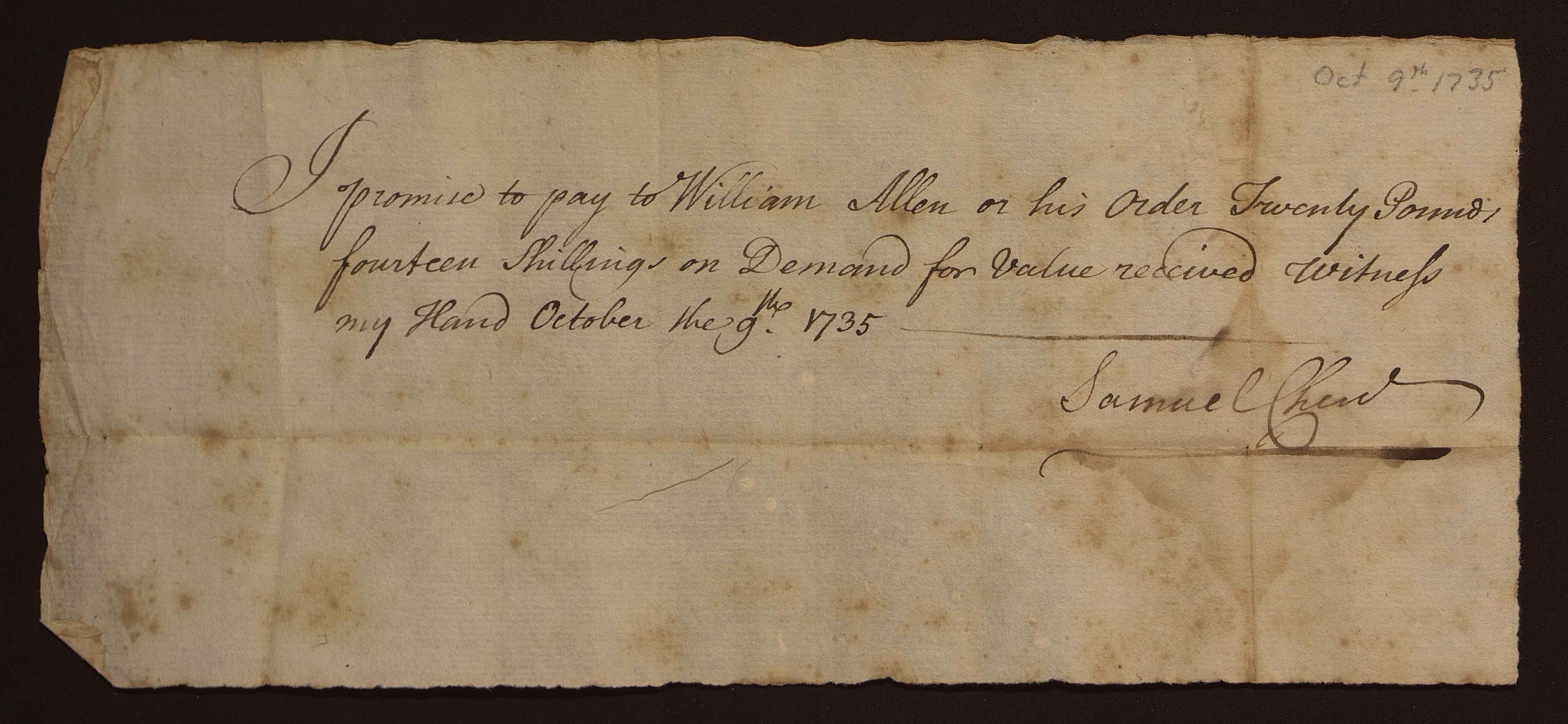 Settlement of Samuel Chew estate (1729-1753)
Settlement of Samuel Chew estate (1729-1753) Primarily consisting of account records, the most notable item in this subseries is a booklet containing the inventory of Mary Chew’s estate at the time of her death in 1747. In addition to describing in detail the clothing and household goods owned by Mary Chew, the inventory contains descriptions of the slaves held by the Chew family.
-
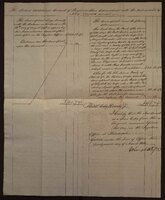 Settlements of Mary Oswald's estate made by Benjamin Chew (1792-1800)
Settlements of Mary Oswald's estate made by Benjamin Chew (1792-1800) As part of Joseph Turner's estate, Benjamin and Elizabeth Chew also became administrators of Elizabeth’s mother Mary Oswald's estate, as she had appointed her brother Joseph Turner as one of her executors.
-
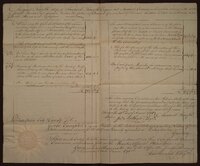 Settlements of Joseph Turner's estate by Margaret Oswald Smyth (1791-1796)
Settlements of Joseph Turner's estate by Margaret Oswald Smyth (1791-1796) William Allen wrote to Chew about legal and political affairs and discussed the iron works in New Jersey that he co-owned with Benjamin Chew's brother in law, Joseph Turner.
-
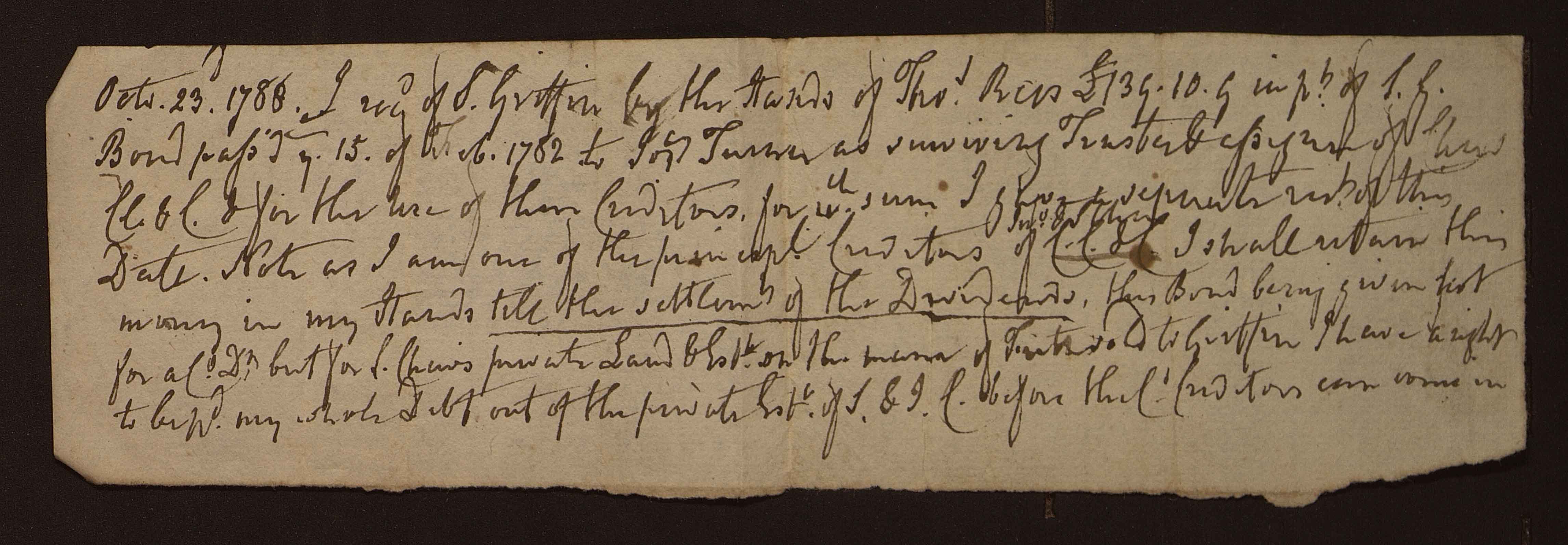 Samuel Griffin bond (1783-1795)
Samuel Griffin bond (1783-1795) This subseries contains accounts, bonds, correspondence, deeds, estate inventories, leases, legal documents, and materials documenting the sale and transfer of several slaves from Benjamin Chew to Margaret Oswald Smyth.
-
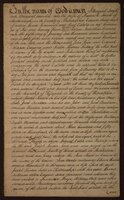 Margaret Oswald Smyth's will (1790)
Margaret Oswald Smyth's will (1790) Includes information about Turner’s properties in NJ, including the iron works.
-
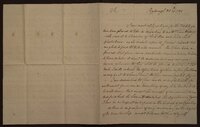 Margaret Oswald Smyth to Dr. Thomas Parke (1789)
Margaret Oswald Smyth to Dr. Thomas Parke (1789) Two letters to Dr. Thomas Park regarding her role has executor of her late uncle Thomas Turner's estate. Both letters mention Whitehall and Wilton Plantations and her general finances, and the first mentions the hiring of arbitrators. She also consistently refers to "Mr. Chew", presumably her brother-in-law, Benjamin Chew (1722-1810).
-
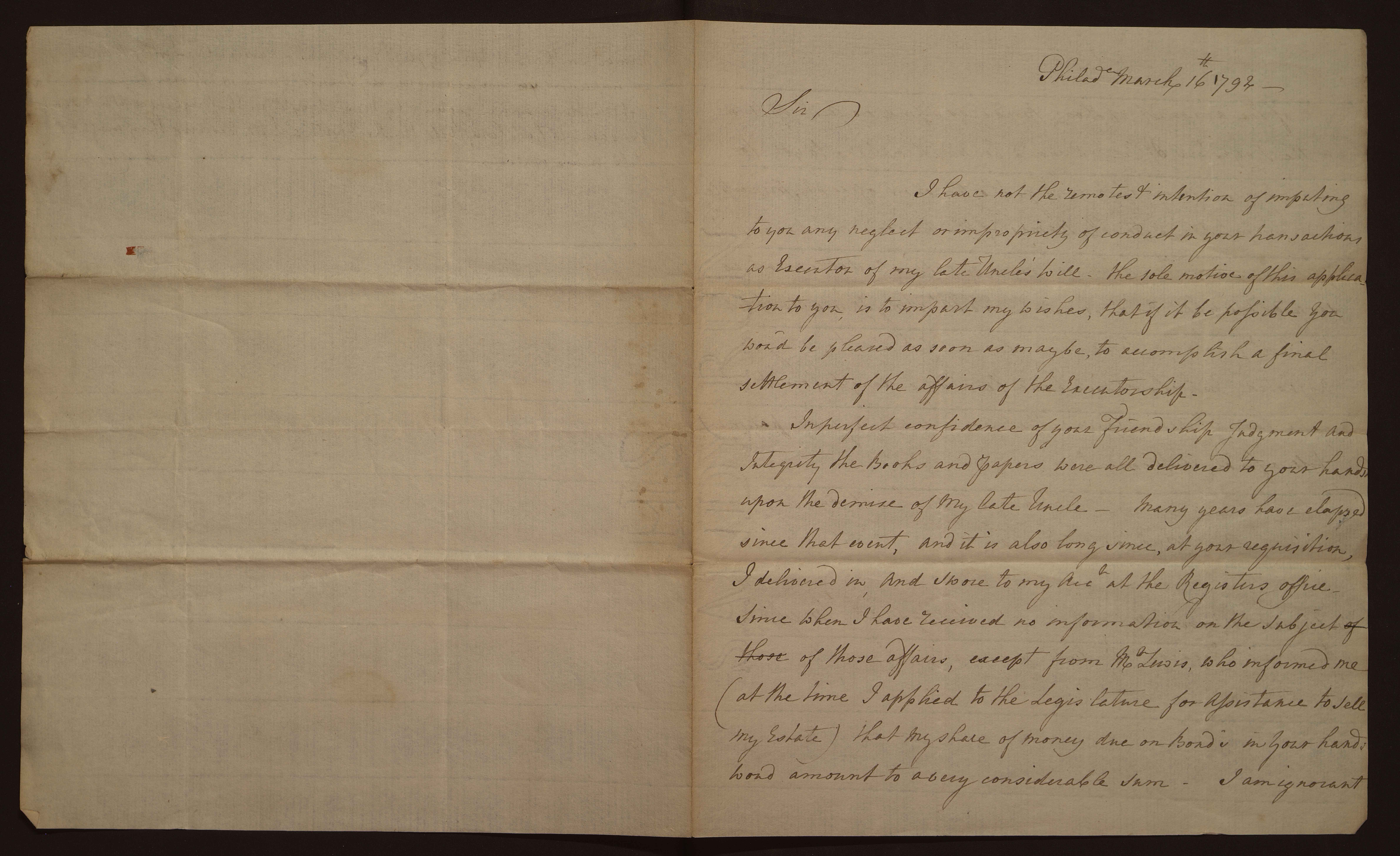 Margaret Oswald Smyth to Benjamin Chew (with responses) (1784-1792, undated)
Margaret Oswald Smyth to Benjamin Chew (with responses) (1784-1792, undated) Margaret Oswald Smyth, sister of Elizabeth Oswald Chew, was a legatee of Thomas Turner's estate, and later an executor and heir of Joseph Turner's estate. She inherited Wilton Plantation, but was unable to maintain the property, forcing her to rent it to various tenants. After her marriage to Frederick Smyth, the couple petitioned for financial support from the estate through Benjamin and Elizabeth Chew. Their requests for money became so persistent that the case was brought into arbitration. As part of Joseph Turner's estate, Benjamin and Elizabeth Chew also became administrators of Elizabeth’s mother Mary Oswald's estate, as she had appointed her brother Joseph Turner as one of her executors. This subseries contains accounts, bonds, correspondence, deeds, estate inventories, leases, legal documents, and materials documenting the sale and transfer of several slaves from Benjamin Chew to Margaret Oswald Smyth.
-
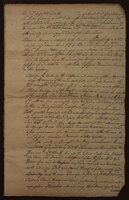 Margaret Oswald and Frederick Smyth marriage contract (1784)
Margaret Oswald and Frederick Smyth marriage contract (1784) Margaret Oswald Smyth, sister of Elizabeth Oswald Chew, was a legatee of Thomas Turner's estate, and later an executor and heir of Joseph Turner's estate. She inherited Wilton Plantation, but was unable to maintain the property, forcing her to rent it to various tenants. After her marriage to Frederick Smyth, the couple petitioned for financial support from the estate through Benjamin and Elizabeth Chew. Their requests for money became so persistent that the case was brought into arbitration. As part of Joseph Turner's estate, Benjamin and Elizabeth Chew also became administrators of Elizabeth’s mother Mary Oswald's estate, as she had appointed her brother Joseph Turner as one of her executors. This subseries contains accounts, bonds, correspondence, deeds, estate inventories, leases, legal documents, and materials documenting the sale and transfer of several slaves from Benjamin Chew to Margaret Oswald Smyth.
-
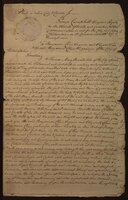 Mary Oswald's will, appointing Joseph Turner executor (1762)
Mary Oswald's will, appointing Joseph Turner executor (1762) As part of Joseph Turner's estate, Benjamin and Elizabeth Chew also became administrators of Elizabeth’s mother Mary Oswald's estate, as she had appointed her brother Joseph Turner as one of her executors. Mentions a "lot of land containing about two acres and three quarters" in the Northern Liberties section of Philadelphia.
 Benjamin Chew Jr. to Samuel Chew, October 19,1804 Letter from Benjamin Chew Jr to Samuel Chew primarily discussing the poor weather and states his servant & carriage driver "Dick", possibly enslaved, was held up by the rain. Benjamin remarks on his attendance of Mary Wilcocks' wedding, as well as the cost of repairs to a carriage.
Benjamin Chew Jr. to Samuel Chew, October 19,1804 Letter from Benjamin Chew Jr to Samuel Chew primarily discussing the poor weather and states his servant & carriage driver "Dick", possibly enslaved, was held up by the rain. Benjamin remarks on his attendance of Mary Wilcocks' wedding, as well as the cost of repairs to a carriage. Benjamin Chew to Samuel Chew, undated Letter from Benjamin Chew to Samuel Chew, remarking on yellow fever in Chestertown as well as a treaty signed by the president the day prior. At the end of the letter it states. "Hammond took (?) his departure this morning Bond is now charge in attains (?)".
Benjamin Chew to Samuel Chew, undated Letter from Benjamin Chew to Samuel Chew, remarking on yellow fever in Chestertown as well as a treaty signed by the president the day prior. At the end of the letter it states. "Hammond took (?) his departure this morning Bond is now charge in attains (?)". Benjamin Chew Jr. to his sisters Chew, Howard, Philips, & Nicklin (1784-1839, undated) This folder is primarily reflective of Benjamin Chew, Jr.'s family life. It includes a letter to Peggy Chew from April 1784 where Benjamin details his vibrant social life and those he's met while studying in England. There is also an invitation to Henrietta, Maria, and "Mrs. Phillips" for dinner at Cliveden on March 17, 1839.
Benjamin Chew Jr. to his sisters Chew, Howard, Philips, & Nicklin (1784-1839, undated) This folder is primarily reflective of Benjamin Chew, Jr.'s family life. It includes a letter to Peggy Chew from April 1784 where Benjamin details his vibrant social life and those he's met while studying in England. There is also an invitation to Henrietta, Maria, and "Mrs. Phillips" for dinner at Cliveden on March 17, 1839. Letters from Benjamin Chew, Jr. to Benjamin Chew, Sr. (1807, undated) Three letters from Benjamin Chew, Jr. to his father. The first letter seems to have been written on a note from a man asking Benajmin, Jr. if his father plans on selling his horses. The second letter is small and mentions Joshua Wallace and Thomas Biddle. On the back is a list of "deposits" from prominent men to one another, such as Edward Tilghman and Daniel Coxe, though it does not specify what for, but to be delivered to Thomas Newman. The first two small letters may have been enclosed in the third.
Letters from Benjamin Chew, Jr. to Benjamin Chew, Sr. (1807, undated) Three letters from Benjamin Chew, Jr. to his father. The first letter seems to have been written on a note from a man asking Benajmin, Jr. if his father plans on selling his horses. The second letter is small and mentions Joshua Wallace and Thomas Biddle. On the back is a list of "deposits" from prominent men to one another, such as Edward Tilghman and Daniel Coxe, though it does not specify what for, but to be delivered to Thomas Newman. The first two small letters may have been enclosed in the third. Property Sales – List of slaves sold from Samuel Chew's Cecil County plantations, 1812 Found within a copy of "Samuel Chew's List of Sales for Benj. Chew, Esq." A comprehensive list of items sold from Samuel Chew's estate, including two pages listing the sales of slaves from Frisbey's Meadows, Great Plantation, and Rich Neck (images 5 & 6). Each line includes the slave's name, the name of the purchaser, and their price. There are a few lines indicating slaves not sold, such as Molly and Patty from Great Plantation, as well as "James" who was given to his mother. African American people mentioned: Frank, James, Bill, Perry, Ben, Solomon, Nicholas, Juliana, Sofhia (sp?), Lucy, Phoebe, Lemon, Abraham, Tom, Polly, Lydia, Emeline, Harriott, Susan, Nancy, Washington, James, John, William, James, Ephraim, "old Dick", Michael, Nat (sp?), Enoi, Henry, Philip, Aaron, Michael, Ben, Ro(sp?), Bill, Abraham, Sylvia, Judith's son (?), Jane, Eliza, Deana, Judith, Beck, Maria
Property Sales – List of slaves sold from Samuel Chew's Cecil County plantations, 1812 Found within a copy of "Samuel Chew's List of Sales for Benj. Chew, Esq." A comprehensive list of items sold from Samuel Chew's estate, including two pages listing the sales of slaves from Frisbey's Meadows, Great Plantation, and Rich Neck (images 5 & 6). Each line includes the slave's name, the name of the purchaser, and their price. There are a few lines indicating slaves not sold, such as Molly and Patty from Great Plantation, as well as "James" who was given to his mother. African American people mentioned: Frank, James, Bill, Perry, Ben, Solomon, Nicholas, Juliana, Sofhia (sp?), Lucy, Phoebe, Lemon, Abraham, Tom, Polly, Lydia, Emeline, Harriott, Susan, Nancy, Washington, James, John, William, James, Ephraim, "old Dick", Michael, Nat (sp?), Enoi, Henry, Philip, Aaron, Michael, Ben, Ro(sp?), Bill, Abraham, Sylvia, Judith's son (?), Jane, Eliza, Deana, Judith, Beck, Maria Property Sales – Inventories of Samuel Chew's estate, 1809 Inventories taken shortly after Samuel Chew's death, notices of property sales, lists of items sold, and lists of buyers and their payment schedules provide a detailed record of his material possessions. Many of these documents list slaves from the family's Maryland farms (Swan Point, the Great Plantation, Frisby’s Meadows, Veazey Farm) along with their monetary values, notes indicating those who were considered less valuable due to age or other infirmity, and names of spouse, children, and/or other family members. The official inventories of the estate also list provisions sent for use of the slaves, such as bacon, blankets, livestock, and other essentials. A separate file contains records of slaves sold and their buyers, provisions made for aged slaves, and other notes.
Property Sales – Inventories of Samuel Chew's estate, 1809 Inventories taken shortly after Samuel Chew's death, notices of property sales, lists of items sold, and lists of buyers and their payment schedules provide a detailed record of his material possessions. Many of these documents list slaves from the family's Maryland farms (Swan Point, the Great Plantation, Frisby’s Meadows, Veazey Farm) along with their monetary values, notes indicating those who were considered less valuable due to age or other infirmity, and names of spouse, children, and/or other family members. The official inventories of the estate also list provisions sent for use of the slaves, such as bacon, blankets, livestock, and other essentials. A separate file contains records of slaves sold and their buyers, provisions made for aged slaves, and other notes. Property Sales – Conditions for the auction of "stock" from Benjamin Chew Jr's property Sassafras Neck (1809-1811, undated) Detailed instructions and protocol for the auction, or "vendue", of goods from Benjamin Chew, Jr's property, Sassafras Neck . Does not list what is to be sold.
Property Sales – Conditions for the auction of "stock" from Benjamin Chew Jr's property Sassafras Neck (1809-1811, undated) Detailed instructions and protocol for the auction, or "vendue", of goods from Benjamin Chew, Jr's property, Sassafras Neck . Does not list what is to be sold. Inventories - informal notes and lists regarding Samuel Chew's estate, 1809-1812, n.d. Collection of informal notes and lists regarding the inventory of Samuel Chew's estate. Documents range from lists of stock, sundries, and slaves (with name and age) at Swan Point from overseer a Joel Smith, a list from Veazey's of farm utensils and enslaved people, a list of Samuel Chew's personal papers gathered by Frisby Tilghman and Benjamin Chew, Jr., and various notes on individual slaves. A collection of notes presumably by Benajmin, Jr., includes entries such as, "Abraham a very valuable character" and a reminder to "Enquire abt Henry and son of Lucy now at Rich Neck whether to take to Philada." There is also a list of expenses regarding Old Mark and Old Jenny, as well as a list of clothes for male slaves.
Inventories - informal notes and lists regarding Samuel Chew's estate, 1809-1812, n.d. Collection of informal notes and lists regarding the inventory of Samuel Chew's estate. Documents range from lists of stock, sundries, and slaves (with name and age) at Swan Point from overseer a Joel Smith, a list from Veazey's of farm utensils and enslaved people, a list of Samuel Chew's personal papers gathered by Frisby Tilghman and Benjamin Chew, Jr., and various notes on individual slaves. A collection of notes presumably by Benajmin, Jr., includes entries such as, "Abraham a very valuable character" and a reminder to "Enquire abt Henry and son of Lucy now at Rich Neck whether to take to Philada." There is also a list of expenses regarding Old Mark and Old Jenny, as well as a list of clothes for male slaves. Inventories of Samuel Chew's estate, 1809-1812, n.d. Comprehensive inventories taken shortly after Samuel Chew's death, primarily lists of items sold and sometimes their buyers and payment schedules, providing a detailed record of his material possessions. Records are sectioned by property- home in Chestertown, Swan Point, the Great Plantation, Frisby’s Meadows, and/or Veazey Farm. Many of these documents include lists of slaves with their name, age, any infirmaries such as blindness or simply "sickly", and sale prices/worth, and often are found within lists of goods like household furniture or livestock (such as images 13 & 14.) The official inventories of the estate also list provisions sent for use of the slaves, such as bacon, blankets, livestock, and other essentials.
Inventories of Samuel Chew's estate, 1809-1812, n.d. Comprehensive inventories taken shortly after Samuel Chew's death, primarily lists of items sold and sometimes their buyers and payment schedules, providing a detailed record of his material possessions. Records are sectioned by property- home in Chestertown, Swan Point, the Great Plantation, Frisby’s Meadows, and/or Veazey Farm. Many of these documents include lists of slaves with their name, age, any infirmaries such as blindness or simply "sickly", and sale prices/worth, and often are found within lists of goods like household furniture or livestock (such as images 13 & 14.) The official inventories of the estate also list provisions sent for use of the slaves, such as bacon, blankets, livestock, and other essentials. Letters from Benjamin Chew & Benjamin Chew, Jr. to Samuel Chew (1793-1806, undated) Focuses on two letters, the first dated April 15, 1806 (images 5 & 6) from Benjamin Chew, Jr. and Benjamin Chew to their uncle and brother Samuel Chew, written on opposite sides of the same paper. Benjamin, Jr. states that he is obliged to his Uncle John to "make communication to Saml Beck who has made enquiries on behalf of Capt Vickers about the cursed Langford’s Bay Plantation” but does not state about what exactly. The second letter (image 14), is simply dated "Thursday night", again a dual letter from Benjamin Chew, Jr. and his father. It focuses mostly on political matters, including multiple mentions of "Mr. Jay" (John Jay), and discusses the "12th article" and its effect on trade, specifically sugar and cotton, especially with the West Indies. He states that "in the two or 3 Southern States... the Article met an almost unanimous disapprobation - the Motion for the Suspension of it came from the warmest Federalist - the subject of the Blacks is passed in Silence & nothing discussed in relation to them.”
Letters from Benjamin Chew & Benjamin Chew, Jr. to Samuel Chew (1793-1806, undated) Focuses on two letters, the first dated April 15, 1806 (images 5 & 6) from Benjamin Chew, Jr. and Benjamin Chew to their uncle and brother Samuel Chew, written on opposite sides of the same paper. Benjamin, Jr. states that he is obliged to his Uncle John to "make communication to Saml Beck who has made enquiries on behalf of Capt Vickers about the cursed Langford’s Bay Plantation” but does not state about what exactly. The second letter (image 14), is simply dated "Thursday night", again a dual letter from Benjamin Chew, Jr. and his father. It focuses mostly on political matters, including multiple mentions of "Mr. Jay" (John Jay), and discusses the "12th article" and its effect on trade, specifically sugar and cotton, especially with the West Indies. He states that "in the two or 3 Southern States... the Article met an almost unanimous disapprobation - the Motion for the Suspension of it came from the warmest Federalist - the subject of the Blacks is passed in Silence & nothing discussed in relation to them.” Benjamin Chew to Samuel Chew, October 16, 1804 The first letter mentions a "letter by Dick," an enslaved man. Likely meaning that specific letter was delivered by him to Samuel Chew.
Benjamin Chew to Samuel Chew, October 16, 1804 The first letter mentions a "letter by Dick," an enslaved man. Likely meaning that specific letter was delivered by him to Samuel Chew. Various accounts and receipts for the plantations of Samuel Chew, 1795-1809 Receipts or account records for John Sappington, James Scanlan, and James Berry who rented/managed plantations for Samuel Chew, as well as a few other unknown individuals. These include receipts for hickory wood, liquor (described as "two gallons of spirit"), new ploughs, and a receipt for the making of clothing including a new coat and breeches for Dick, an enslaved man, and a vest and coat for "Charles Gordin" (possibly also enslaved?).
Various accounts and receipts for the plantations of Samuel Chew, 1795-1809 Receipts or account records for John Sappington, James Scanlan, and James Berry who rented/managed plantations for Samuel Chew, as well as a few other unknown individuals. These include receipts for hickory wood, liquor (described as "two gallons of spirit"), new ploughs, and a receipt for the making of clothing including a new coat and breeches for Dick, an enslaved man, and a vest and coat for "Charles Gordin" (possibly also enslaved?). Three receipts from William Forbes for slaves' shoes, 1797-1801 Three separate receipts from William Forbes to Samuel Chew (1737-1809), reflected in images 5-9. The first receipt, dated July 31, 1797, is for 90 pairs of shoes for 9 pounds 10 shillings, witnessed by James Barroll. The second, dated August 20, 1801, is for "79 pair of negro shoes," and the third receipt from October 2, 1800 charges for the "making 84 pair of Negro shoes."
Three receipts from William Forbes for slaves' shoes, 1797-1801 Three separate receipts from William Forbes to Samuel Chew (1737-1809), reflected in images 5-9. The first receipt, dated July 31, 1797, is for 90 pairs of shoes for 9 pounds 10 shillings, witnessed by James Barroll. The second, dated August 20, 1801, is for "79 pair of negro shoes," and the third receipt from October 2, 1800 charges for the "making 84 pair of Negro shoes." Note mentioning James Cannon, January 20, 1800 Small cutting of paper referring to James Cannon, possibly an estate manager of the Chew's. It is unclear what it is for, but the back identifies it as belonging to the account of "Thomas Etherington." Represented in images 4 and 5.
Note mentioning James Cannon, January 20, 1800 Small cutting of paper referring to James Cannon, possibly an estate manager of the Chew's. It is unclear what it is for, but the back identifies it as belonging to the account of "Thomas Etherington." Represented in images 4 and 5. Note regarding payment to overseer of Swan Point, John Deal, by Ann Frisby and Samuel Chew Image 14 is a small note regarding the payment of wages to John Deal as overseer of Swan Point. It is unclear whether the note is from Mrs. Ann Frisby, or to her, as it is signed by both John Deal and "Tho. Van Dyke." States he was paid 1 pound 17 shillings 6 pence by S. Chew on March 19, 1784.
Note regarding payment to overseer of Swan Point, John Deal, by Ann Frisby and Samuel Chew Image 14 is a small note regarding the payment of wages to John Deal as overseer of Swan Point. It is unclear whether the note is from Mrs. Ann Frisby, or to her, as it is signed by both John Deal and "Tho. Van Dyke." States he was paid 1 pound 17 shillings 6 pence by S. Chew on March 19, 1784. Miscellaneous receipts for Samuel Chew's plantations, 1782-1807, n.d. Receipts for James Scanlan and James Berry who helped manage plantations for Samuel Chew, as well as other miscellaneous receipts for Samuel's properties. One of the first documents is a small receipt for James Scanlan for $2 for the repair of ploughs at Great Plantation. Another is a bill for James Berry from someone named "Stepney Congo" for services such as carrying his cart and horses over the ferry and once "[his] boy and horse". There is also a document of accounting from Owen Crow, listing expenses for rent at one of Samuel Chew's Cecil plantations dated May 20, 1795. Expenses include barrels of corn, payment to himself, sundry work such as glazing windows and making nails, and a midwife's services.
Miscellaneous receipts for Samuel Chew's plantations, 1782-1807, n.d. Receipts for James Scanlan and James Berry who helped manage plantations for Samuel Chew, as well as other miscellaneous receipts for Samuel's properties. One of the first documents is a small receipt for James Scanlan for $2 for the repair of ploughs at Great Plantation. Another is a bill for James Berry from someone named "Stepney Congo" for services such as carrying his cart and horses over the ferry and once "[his] boy and horse". There is also a document of accounting from Owen Crow, listing expenses for rent at one of Samuel Chew's Cecil plantations dated May 20, 1795. Expenses include barrels of corn, payment to himself, sundry work such as glazing windows and making nails, and a midwife's services. Settlement of Samuel Chew estate (1729-1753) Primarily consisting of account records, the most notable item in this subseries is a booklet containing the inventory of Mary Chew’s estate at the time of her death in 1747. In addition to describing in detail the clothing and household goods owned by Mary Chew, the inventory contains descriptions of the slaves held by the Chew family.
Settlement of Samuel Chew estate (1729-1753) Primarily consisting of account records, the most notable item in this subseries is a booklet containing the inventory of Mary Chew’s estate at the time of her death in 1747. In addition to describing in detail the clothing and household goods owned by Mary Chew, the inventory contains descriptions of the slaves held by the Chew family. Settlements of Mary Oswald's estate made by Benjamin Chew (1792-1800) As part of Joseph Turner's estate, Benjamin and Elizabeth Chew also became administrators of Elizabeth’s mother Mary Oswald's estate, as she had appointed her brother Joseph Turner as one of her executors.
Settlements of Mary Oswald's estate made by Benjamin Chew (1792-1800) As part of Joseph Turner's estate, Benjamin and Elizabeth Chew also became administrators of Elizabeth’s mother Mary Oswald's estate, as she had appointed her brother Joseph Turner as one of her executors. Settlements of Joseph Turner's estate by Margaret Oswald Smyth (1791-1796) William Allen wrote to Chew about legal and political affairs and discussed the iron works in New Jersey that he co-owned with Benjamin Chew's brother in law, Joseph Turner.
Settlements of Joseph Turner's estate by Margaret Oswald Smyth (1791-1796) William Allen wrote to Chew about legal and political affairs and discussed the iron works in New Jersey that he co-owned with Benjamin Chew's brother in law, Joseph Turner. Samuel Griffin bond (1783-1795) This subseries contains accounts, bonds, correspondence, deeds, estate inventories, leases, legal documents, and materials documenting the sale and transfer of several slaves from Benjamin Chew to Margaret Oswald Smyth.
Samuel Griffin bond (1783-1795) This subseries contains accounts, bonds, correspondence, deeds, estate inventories, leases, legal documents, and materials documenting the sale and transfer of several slaves from Benjamin Chew to Margaret Oswald Smyth. Margaret Oswald Smyth's will (1790) Includes information about Turner’s properties in NJ, including the iron works.
Margaret Oswald Smyth's will (1790) Includes information about Turner’s properties in NJ, including the iron works. Margaret Oswald Smyth to Dr. Thomas Parke (1789) Two letters to Dr. Thomas Park regarding her role has executor of her late uncle Thomas Turner's estate. Both letters mention Whitehall and Wilton Plantations and her general finances, and the first mentions the hiring of arbitrators. She also consistently refers to "Mr. Chew", presumably her brother-in-law, Benjamin Chew (1722-1810).
Margaret Oswald Smyth to Dr. Thomas Parke (1789) Two letters to Dr. Thomas Park regarding her role has executor of her late uncle Thomas Turner's estate. Both letters mention Whitehall and Wilton Plantations and her general finances, and the first mentions the hiring of arbitrators. She also consistently refers to "Mr. Chew", presumably her brother-in-law, Benjamin Chew (1722-1810). Margaret Oswald Smyth to Benjamin Chew (with responses) (1784-1792, undated) Margaret Oswald Smyth, sister of Elizabeth Oswald Chew, was a legatee of Thomas Turner's estate, and later an executor and heir of Joseph Turner's estate. She inherited Wilton Plantation, but was unable to maintain the property, forcing her to rent it to various tenants. After her marriage to Frederick Smyth, the couple petitioned for financial support from the estate through Benjamin and Elizabeth Chew. Their requests for money became so persistent that the case was brought into arbitration. As part of Joseph Turner's estate, Benjamin and Elizabeth Chew also became administrators of Elizabeth’s mother Mary Oswald's estate, as she had appointed her brother Joseph Turner as one of her executors. This subseries contains accounts, bonds, correspondence, deeds, estate inventories, leases, legal documents, and materials documenting the sale and transfer of several slaves from Benjamin Chew to Margaret Oswald Smyth.
Margaret Oswald Smyth to Benjamin Chew (with responses) (1784-1792, undated) Margaret Oswald Smyth, sister of Elizabeth Oswald Chew, was a legatee of Thomas Turner's estate, and later an executor and heir of Joseph Turner's estate. She inherited Wilton Plantation, but was unable to maintain the property, forcing her to rent it to various tenants. After her marriage to Frederick Smyth, the couple petitioned for financial support from the estate through Benjamin and Elizabeth Chew. Their requests for money became so persistent that the case was brought into arbitration. As part of Joseph Turner's estate, Benjamin and Elizabeth Chew also became administrators of Elizabeth’s mother Mary Oswald's estate, as she had appointed her brother Joseph Turner as one of her executors. This subseries contains accounts, bonds, correspondence, deeds, estate inventories, leases, legal documents, and materials documenting the sale and transfer of several slaves from Benjamin Chew to Margaret Oswald Smyth. Margaret Oswald and Frederick Smyth marriage contract (1784) Margaret Oswald Smyth, sister of Elizabeth Oswald Chew, was a legatee of Thomas Turner's estate, and later an executor and heir of Joseph Turner's estate. She inherited Wilton Plantation, but was unable to maintain the property, forcing her to rent it to various tenants. After her marriage to Frederick Smyth, the couple petitioned for financial support from the estate through Benjamin and Elizabeth Chew. Their requests for money became so persistent that the case was brought into arbitration. As part of Joseph Turner's estate, Benjamin and Elizabeth Chew also became administrators of Elizabeth’s mother Mary Oswald's estate, as she had appointed her brother Joseph Turner as one of her executors. This subseries contains accounts, bonds, correspondence, deeds, estate inventories, leases, legal documents, and materials documenting the sale and transfer of several slaves from Benjamin Chew to Margaret Oswald Smyth.
Margaret Oswald and Frederick Smyth marriage contract (1784) Margaret Oswald Smyth, sister of Elizabeth Oswald Chew, was a legatee of Thomas Turner's estate, and later an executor and heir of Joseph Turner's estate. She inherited Wilton Plantation, but was unable to maintain the property, forcing her to rent it to various tenants. After her marriage to Frederick Smyth, the couple petitioned for financial support from the estate through Benjamin and Elizabeth Chew. Their requests for money became so persistent that the case was brought into arbitration. As part of Joseph Turner's estate, Benjamin and Elizabeth Chew also became administrators of Elizabeth’s mother Mary Oswald's estate, as she had appointed her brother Joseph Turner as one of her executors. This subseries contains accounts, bonds, correspondence, deeds, estate inventories, leases, legal documents, and materials documenting the sale and transfer of several slaves from Benjamin Chew to Margaret Oswald Smyth. Mary Oswald's will, appointing Joseph Turner executor (1762) As part of Joseph Turner's estate, Benjamin and Elizabeth Chew also became administrators of Elizabeth’s mother Mary Oswald's estate, as she had appointed her brother Joseph Turner as one of her executors. Mentions a "lot of land containing about two acres and three quarters" in the Northern Liberties section of Philadelphia.
Mary Oswald's will, appointing Joseph Turner executor (1762) As part of Joseph Turner's estate, Benjamin and Elizabeth Chew also became administrators of Elizabeth’s mother Mary Oswald's estate, as she had appointed her brother Joseph Turner as one of her executors. Mentions a "lot of land containing about two acres and three quarters" in the Northern Liberties section of Philadelphia.